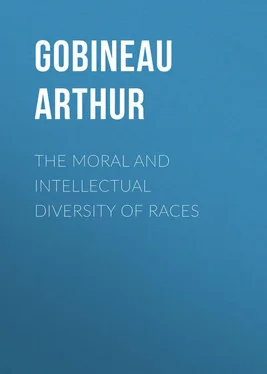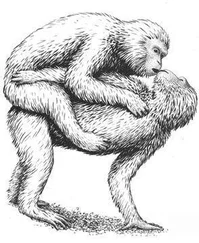Arthur Gobineau - The Moral and Intellectual Diversity of Races
Здесь есть возможность читать онлайн «Arthur Gobineau - The Moral and Intellectual Diversity of Races» — ознакомительный отрывок электронной книги совершенно бесплатно, а после прочтения отрывка купить полную версию. В некоторых случаях можно слушать аудио, скачать через торрент в формате fb2 и присутствует краткое содержание. Жанр: История, foreign_antique, foreign_prose, на английском языке. Описание произведения, (предисловие) а так же отзывы посетителей доступны на портале библиотеки ЛибКат.
- Название:The Moral and Intellectual Diversity of Races
- Автор:
- Жанр:
- Год:неизвестен
- ISBN:нет данных
- Рейтинг книги:4 / 5. Голосов: 1
-
Избранное:Добавить в избранное
- Отзывы:
-
Ваша оценка:
- 80
- 1
- 2
- 3
- 4
- 5
The Moral and Intellectual Diversity of Races: краткое содержание, описание и аннотация
Предлагаем к чтению аннотацию, описание, краткое содержание или предисловие (зависит от того, что написал сам автор книги «The Moral and Intellectual Diversity of Races»). Если вы не нашли необходимую информацию о книге — напишите в комментариях, мы постараемся отыскать её.
The Moral and Intellectual Diversity of Races — читать онлайн ознакомительный отрывок
Ниже представлен текст книги, разбитый по страницам. Система сохранения места последней прочитанной страницы, позволяет с удобством читать онлайн бесплатно книгу «The Moral and Intellectual Diversity of Races», без необходимости каждый раз заново искать на чём Вы остановились. Поставьте закладку, и сможете в любой момент перейти на страницу, на которой закончили чтение.
Интервал:
Закладка:
I have here rapidly sketched a series of pictures from nature, which the historian and ethnographer will not fail to recognize. Whether the features thus cursorily delineated are owing to the causes to which I ascribe them, I must leave for the reader to decide. My space is too limited to allow of my entering into an elaborate argumentation. But I would observe that, by taking this view of the subject, we can understand why all human – and therefore false – religions are so intimately connected with the social and political organization of the peoples which profess them, and why they are so plainly mapped out on the globe as belonging to certain races, to whom alone they are applicable, and beyond whose area they cannot extend: while Christianity knows no political or social forms, no geographical or ethnological limits. The former, being the productions of human intellect, must vary with its variation, and perish in its decay, while revelation is universal and immutable, like the Intelligence of which it is the emanation.
It is time now to conclude the task, the accomplishment of which has carried me far beyond the limits I had at first proposed to myself. If I have so long detained the reader on the threshold of the edifice, it was to facilitate his after progress, and to give him a chart, that he may not lose himself in the vast field it covers. There he may often meet me again, and if I be sometimes deemed officious with my proffered explanations, he will at least give me credit for good intentions, and he may, if he chooses, pass me without recognition. Both this introduction and notes in the body of the work were thought necessary for several reasons. First, the subject is in some measure a new one, and it was important to guard against misconception, and show, right at the beginning, what was attempted to be proved, and in what manner. Secondly, the author wrote for a European public, and many allusions are made, or positions taken, upon an assumed knowledge of facts, of which the general reader on this side of the ocean can be supposed to have but a slight and vague apprehension. Thirdly, the author has, in many cases, contented himself with abstract reasoning, and therefore is sometimes chargeable with obscureness, on which account familiar illustrations have been supplied. Fourthly, the volume now presented to the reader is one of a series of four, the remainder of which, if this meets the public approbation, may in time appear in an English garb. But it was important to make this, as much as possible, independent of the others and complete in itself. The discussion of the moral and intellectual diversities of the various groups of the human family, is, as I have before shown, totally independent of the question of unity or diversity of species; yet, as it increases the interest attached to the solution of that question, which has been but imperfectly discussed by the author, my esteemed friend, Dr. J. C. Nott, who has so often and so ably treated the subject, has promised to furnish, in notes and an appendix, such additional facts pertaining to his province as a naturalist, as may assist the reader in arriving at a correct opinion.
With regard to the translation, it must be observed that it is not a literal rendering of the original. The translator has aimed rather at giving the meaning, than the exact words or phraseology of the author, at no time, however, departing from the former. He has, in some instances, condensed or omitted what seemed irrelevant, or useless to the discussion of the question in this country, and in a few cases, he has transposed a sentence to a different part of the paragraph, where it seemed more in its place, and more effective. To explain and justify these alterations, we must remind our readers that the author wrote for a public essentially different from that of the translator; that continental writers on grave subjects are in general more intent upon vindicating their opinions than the form in which they express them, and seldom devote that attention to style which English or American readers expect; to which may be added that Count Gobineau wrote in the midst of a multiplicity of diplomatic affairs, and had no time, even if he had thought it worth his while, to give his work that literary finish which would satisfy the fastidious. Had circumstances permitted, this translation would have been submitted to his approbation, but at the time of its going to press he is engaged in the service of his country at the court of Persia.
For obtruding the present work on the notice of the American public, no apology will be required. The subject is one of immense importance, and especially in this country, where it can seldom be discussed without adventitious circumstances biassing the inquirers. To the philanthropist, the leading idea of the book, "that different races, like different individuals, are specially fitted for special purposes, for the fulfilment of which they are accountable in the measure laid down in Holy Writ: 'To whom much is given, from him much will be asked,' and that they are equal only when they truly and faithfully perform the duties of their station" – to the philanthropist, this idea must be fraught with many valuable suggestions. So far from loosening the ties of brotherhood, it binds them closer, because it teaches us not to despise those who are endowed differently from us; and shows us that they, too, may have excellencies which we have not.
To the statesman, the student of history, and the general reader, it is hoped that this volume will not be altogether useless, and may assist to a better understanding of many of the problems that have so long puzzled the philosopher. The greatest revolutions in national relations have been accomplished by the migrations of races, the most calamitous wars that have desolated the globe have been the result of the hostility of races. Even now, a cloud is lowering in the horizon. The friend of peace and order watches it with silent anxiety, lest he hasten its coming. The spirit of mischief exults in its approach, but fears to betray his plans. Thus, western and central Europe now present the spectacle of a lull before the storm. Monarchs sit trembling on their thrones, while nations mutter curses. Nor have premonitory symptoms been wanting. Three times, within little more than half a century, have the eruptions of that ever-burning political volcano – France – shaken the social and political system of the civilized world, and shown the amount of combustible materials, which all the efforts of a ruling class cannot always protect from ignition. The grand catastrophe may come within our times. And, is it the result of any particular social condition, the action of any particular class in the social scale, the diffusion of any particular political principles? No, because the revolutionary tendencies are various, and even opposite; if republican in one place, monarchical in another; if democratic in France, aristocratic in Poland. Nor is it a particular social class wherein the revolutionary principle flourishes, for the classes which, in one country, wish subversion, in another, are firmly attached to the established order of things. The poor in Germany are proletarians and revolutionists; in Spain, Portugal, and Italy, the enthusiastic lovers of their king. The better classes in the former country are mostly conservative; in the latter, they are the makers, or rather attempters, of revolutions. Nor is it any particular social condition, for no class is so degraded as it has been; never was poverty less, and prosperity greater in Europe than in the present century; and everywhere the political institutions are more liberal than ever before. Whence, then, this gathering storm? Does it exist only in the minds of the visionary, or is it a mere bugbear of the timorous? Ask the prudent statesman, the traveller who pierces the different strata of the population; look behind the grates of the State-prisons; count – if this be possible – the number of victims of military executions in Germany and Austria, in 1848 and 1849; read the fearful accounts of the taking of Vienna, of Rome, of Ancona, of Venice, during the same short space of time. Everywhere the same cry: Nationality. It is not the temporary ravings of a mob rendered frantic by hunger and misery. It is a question of nationality, a war of races. Happy we who are removed from the immediate scene of the struggle, and can be but remotely affected by it. Yet, while I write, it seems as though the gales of the Atlantic had blown to our peaceful shores some taints of the epidemic that rages in the Old World. May it soon pass over, and a healthy atmosphere again prevail!
Читать дальшеИнтервал:
Закладка:
Похожие книги на «The Moral and Intellectual Diversity of Races»
Представляем Вашему вниманию похожие книги на «The Moral and Intellectual Diversity of Races» списком для выбора. Мы отобрали схожую по названию и смыслу литературу в надежде предоставить читателям больше вариантов отыскать новые, интересные, ещё непрочитанные произведения.
Обсуждение, отзывы о книге «The Moral and Intellectual Diversity of Races» и просто собственные мнения читателей. Оставьте ваши комментарии, напишите, что Вы думаете о произведении, его смысле или главных героях. Укажите что конкретно понравилось, а что нет, и почему Вы так считаете.












